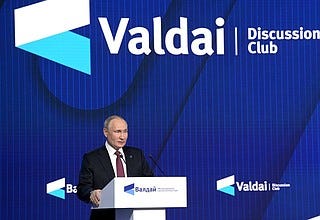On 27 October 2022 the President of Russia, Vladimir Putin gave his traditional speech and plenary discussion at the Valdai Discussion Club. His speech closed on a remarkable note - he called for a “symphony of civilizations” in the emerging multipolar world.
Now I may have two kinds of readers, in this early stage of my life on substack: readers who reflexively dismiss any statement by Vladimir Putin as words emanating from an evil dictator, who rules as an autocrat over benighted Russia; and readers who are prepared to question the assumptions drilled into them by other sources, and are prepared at least to examine how President Putin sees the world. Certainly within the Anglophone world, most readers fit into the first category. If you do, then take your small trust in me that little bit further and open your mind to consider what President Putin is saying here. If you do, then I think you may find yourself surprised. He is setting out a vision for the humane development of the world, that is rooted in more generous values and prudent virtues than those espoused by leaders of the so-called ‘civilized world’.
Visions set out by American, Anglophone and Western European leaders conflate civilization with one strand of humanity, in terms such as ‘Western Civilization’ or the ‘liberal rules-based order’ or ‘our democracy’. In the last month, for example, the European Foreign Minister, Josep Borrel claimed that Europe was a garden and the rest of the world was a jungle. He later apologised for his remarks, but could not conceal the assumptions behind them. The last 30 years of the apparent unipolar world, of the ‘end of history’ and dominance of liberal democracy, and the last 300 years of the ‘Triumph of the West’, also known as the dominance of Anglo-American Empires, have led many leaders and intellectuals of the so-called West to make some catastrophic errors of cultural history. They assumed a temporary military and economic dominance was rooted in inherent cultural resources and founded an irresistable institutional process, globalization. All nations, all cultures would converge on the Anglo-American model. By knocking out the Soviet Union, America assumed they had cleared the world to be taken over by Hollywood and US intelligence agencies. They did not understand culture. They did not understand history. They did not understand states. They did not understand the diversity and divergence of the real world.
Vladimir Putin never made the same mistakes. Since 2007 he has been calling for a multipolar world; but this vision can be seen as a dry demand for international law, diplomatic instutions, and sovereign quality of powerful states. At the Valdai Discussion Club this year, he spoke to the deeper understanding of culture, history and states that underpins his appeal for a ‘symphony of civilizations’. What is the key idea that we should listen to in his speech?
Over the next month or so I will be doing a series of podcasts/videos on this very significant speech and plenary discussion to be posted on my Youtube channel - The Burning Archive. I would encourage all readers of The Burning Archive to also view the full four-hour session themselves. I will examine the key elements of the speech in some mroe detail on the channel.
Perhaps surprisingly (if you are still suspicious that Putin is a ‘killer’ who interferes in American elections and imprisons his opponents), the key idea is that civilizations are plural because traditions are creative. This creative garden, found in every environment and part of the world, cannot be turn into a monoculture, commodity crop by the West.
Putin begins his speech by talking about environmetnal challenges and the threat to biodiversity, and then quickly pivots from the West’s technological exploitation of the planet to its ideological elimination of the diverse cultures of the world.
The loss of biodiversity is one of the most dangerous consequences of disrupting the environmental balance. This brings me to the key point all of us have gathered here for. Is it not equally important to maintain cultural, social, political and civilisational diversity? (Vladimir Putin, 2022)
In expressing this idea, Putin echoes the great historian Felipe Fernàndez-Armesto. In Civilizations (2000). Fernàndez-Armesto insisted there was no one civilization, and that civilization had no mortgage on virtue or progress or manifest destiny. They are inescapably diverse, and that diveristy should be cherished. “Civilizations, compared with other types of society,” he wrote, “certainly have no monopoly of virtue. But a true pluralist has to relish the diversity they add to life.” (Civilizations (2000), p. 30)
The diversity comes the nature of the ‘civilizing itch’ itself - the adaptation of every known environment and nature to human cultural needs - and the source of that itch, imagination. Imagination has driven humans in every part of the world - not only the garden of Europe and the think tanks of America - to forge an astonishing heritage of plural civilizations. I discuss Fernàndez-Armesto’s ideas more in my podcasts 55 to 58, including Cradles and Concepts of Civilization.
Should we not then listen to Putin and support his courage in resisting the global hegemon who wishes to turn this symphony of civilizations into an AI-generated tune coming from Silicon Valley which can be blue check-marked by its censors?
If you would like to read more from me, then you can buy my poetry, Gathering Flowers of the Mind: Collected Poems 1996-2020 at online retailers, and read my prose at www.theburningarchive.com. I will be publishing a collection of my essays and fragments, From the Burning Archive in late November 2022.
You can also listen to my podcast, The Burning Archive on Spotify and other platforms. I am currently doing a series on Russian history, and have done many podcasts previously on the Russia-Ukraine War and the multipolar world.


